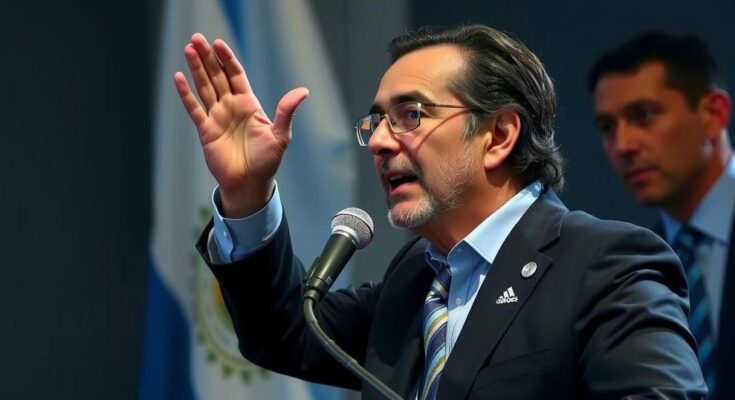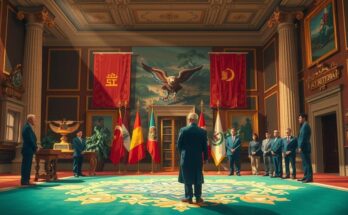Yamandú Orsi has won the presidential election in Uruguay, defeating Álvaro Delgado. Orsi’s victory marks the return of the Broad Front coalition to power after five years of conservative governance. He has emphasized inclusivity and economic growth while planning to maintain dialogue with citizens.
Yamandú Orsi, a left-wing former history teacher, has emerged victorious in the recent presidential election in Uruguay. In the decisive runoff, Orsi defeated Álvaro Delgado of the ruling conservative coalition by a margin exceeding three percentage points. Following the results, Delgado graciously acknowledged his defeat and extended his congratulations to Orsi and the Broad Front coalition, which returns to power after five years of conservative governance. This coalition previously controlled the country for 15 years until 2020 when they were defeated by Luis Lacalle Pou, who, due to constitutional restrictions, could not seek a consecutive term in this election.
At 57 years old, Orsi is regarded as a protégé of José Mujica, a former president known for his austere lifestyle and affectionately referred to as “the world’s poorest president.” Orsi himself has humble origins, having grown up in rural Uruguay in a home devoid of electricity. His political career began as a school history teacher, during which he also engaged in local politics, ultimately serving as the mayor of Canelones, the second-most populous department in Uruguay. During his tenure, he fostered economic development, notably attracting tech giant Google to establish a significant data center in the area.
In his inaugural speech, Orsi emphasized his intent to foster an inclusive presidency for all 3.4 million Uruguayans. He articulated plans to maintain a spirit of dialogue, vowing to consider the perspectives of those who did not support him. “I am going to be the president who builds a more integrated country, where we set aside our differences and nobody is left behind, neither economically, socially or politically,” he stated. Orsi’s Broad Front coalition not only secured the presidency but also achieved a majority in the Uruguayan Senate, although they did not secure a majority within the Chamber of Representatives.
The Uruguayan election distinguished itself by showcasing two moderate candidates, in contrast to the polarizing political climate evident in other nations across the Western Hemisphere, including Argentina, Brazil, and the United States. Outgoing President Lacalle Pou committed to facilitating a smooth transition for Orsi, who is set to be sworn in on March 1 of next year.
The recent presidential election in Uruguay marked a significant political shift, as the left-wing Broad Front coalition returned to power after five years of conservative rule. This election reflects broader trends within Latin America, where nations have navigated differing political ideologies and challenges. Yamandú Orsi’s victory symbolizes a reaffirmation of the Broad Front’s previous governance, which prioritized social welfare and economic development during their long tenure from 2005 to 2020. Orsi’s background as a humble educator and his ties to mentored leaders like José Mujica enhance his personal narrative, appealing to a populace seeking relatable leadership.
Yamandú Orsi’s election as president of Uruguay heralds a renewed era for the Broad Front coalition, emphasizing inclusive governance and economic stability. His commitment to dialogue and addressing the needs of all citizens reflects a desire to unify a diverse nation in the face of contemporary challenges. This election, characterized by moderate candidates, stands in contrast to the more extreme political environments manifesting elsewhere in the Americas.
Original Source: www.bbc.com




